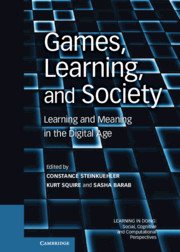Book contents
- Frontmatter
- Contents
- Contributors
- Series Foreword
- Foreword
- Acknowledgments
- Section I Games as Designed Experience
- Section II Games as Emergent Culture
- 10 Introduction to Section II
- 11 Nurturing Affinity Spaces and Game-Based Learning
- 12 Apprenticeship in Massively Multiplayer Online Games
- 13 Theorycrafting
- 14 Culture and Community in a Virtual World for Young Children
- 15 Culture versus Architecture
- 16 Participatory Media Spaces
- Section III Games as Twenty-First-Century Curriculum
- Index
- References
14 - Culture and Community in a Virtual World for Young Children
Published online by Cambridge University Press: 05 August 2012
- Frontmatter
- Contents
- Contributors
- Series Foreword
- Foreword
- Acknowledgments
- Section I Games as Designed Experience
- Section II Games as Emergent Culture
- 10 Introduction to Section II
- 11 Nurturing Affinity Spaces and Game-Based Learning
- 12 Apprenticeship in Massively Multiplayer Online Games
- 13 Theorycrafting
- 14 Culture and Community in a Virtual World for Young Children
- 15 Culture versus Architecture
- 16 Participatory Media Spaces
- Section III Games as Twenty-First-Century Curriculum
- Index
- References
Summary
As evidenced by many of the chapters in this volume, robust research is emerging that explores the role of video games and virtual worlds in young people’s learning. However, far fewer studies have looked at the role of culture and community in relation to learning not only within these virtual spaces but also in the fan communities that surround them. Moreover, there are even fewer, if any, studies that explore these topics in the context of virtual worlds for very young children. This chapter addresses this gap through a focus on culture and community within and surrounding Webkinz World (WW), a virtual environment designed for children between the ages of six and thirteen.
While video games such as World of Warcraft and virtual worlds such as Second Life that target adolescents and adults have been popular for years, online environments aimed at preteen populations (between the ages of six and twelve) are a relatively new phenomenon. Recently, there has been a marked increase in the development of such spaces, with Webkinz World (www.webkinz.com), Club Penguin (www.clubpenguin.com), Neopets (www.neopets.com), and Barbie Girls (www.barbiegirls.com) among the most popular. These sites garner a significant number of monthly visitors, with Webkinz World attracting approximately twenty-eight million monthly visits in June 2009, Club Penguin and Neopets boasting approximately ten and ten and a half million, respectively, and Barbie Girls attracting nearly eight hundred and fifty thousand (Compete, Inc., 2009). Despite the rampant popularity of such sites, we know very little about children’s activities in these spaces at present.
- Type
- Chapter
- Information
- Games, Learning, and SocietyLearning and Meaning in the Digital Age, pp. 210 - 228Publisher: Cambridge University PressPrint publication year: 2012
References
- 5
- Cited by

